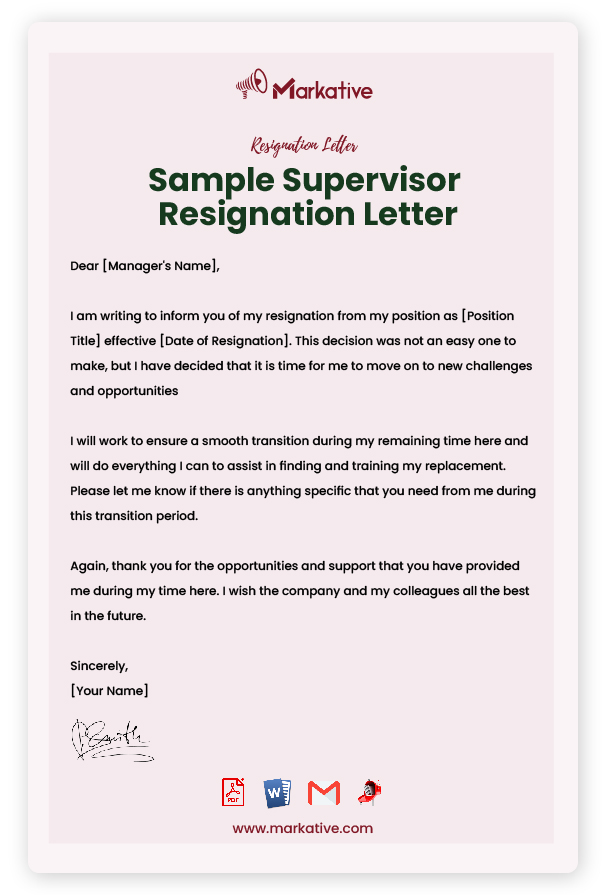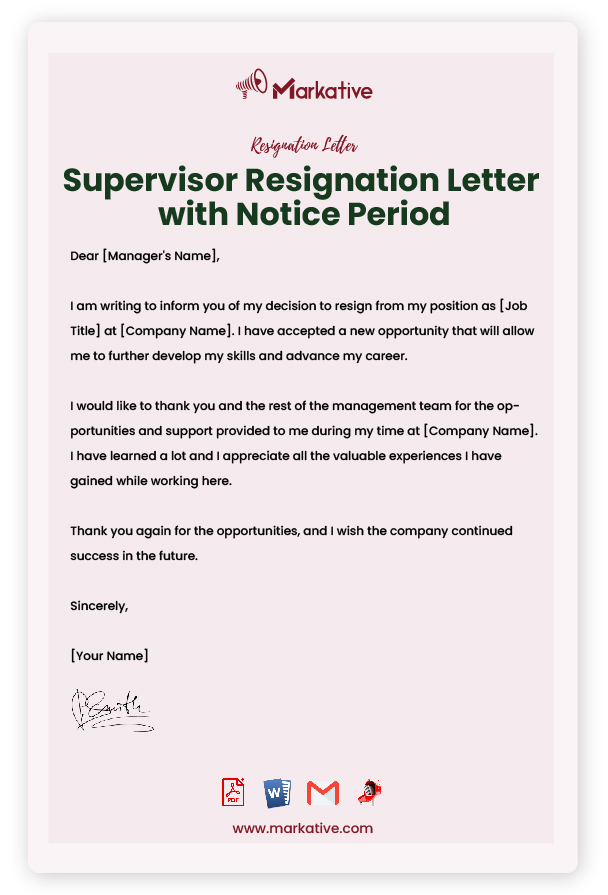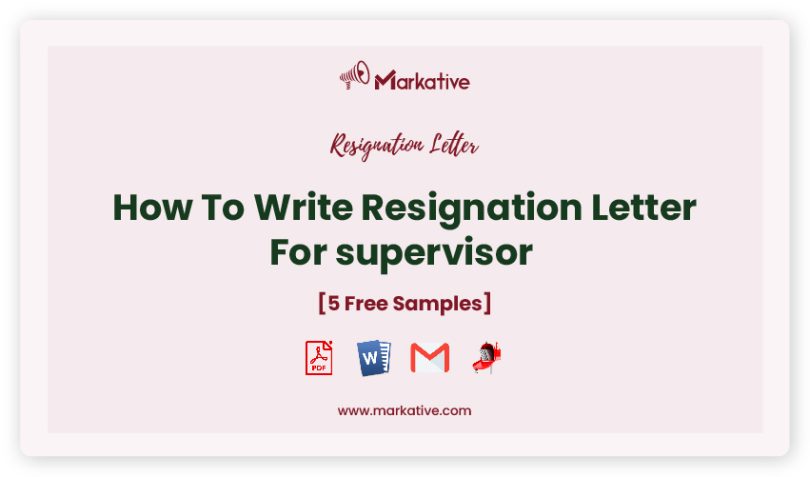Resignation is a crucial aspect of any organization, and it is equally significant for supervisors to resign professionally. The resignation process provides an opportunity for supervisors to leave their position in a manner that creates a positive impact on the organization and its employees. A well-written resignation letter can serve as an essential communication tool that demonstrates respect and appreciation towards the company, its management, and fellow colleagues. In this article, we will discuss the importance of a supervisor’s resignation letter, how a good resignation can create a positive impact, and why it is crucial to handle the process professionally.
A good resignation letter is not just a formality but an opportunity to reflect on one’s contributions and achievements while working with the organization. It can also help identify areas that require improvement, which can be useful for the company’s management team. Additionally, a well-written resignation letter creates a positive impact on the morale of the organization’s employees, indicating that the supervisor is leaving on good terms and values the company and its culture. Therefore, it is important to take the resignation process seriously and handle it professionally.
In this article, we will provide useful tips on how to write an effective Supervisor Resignation Letter that will help supervisors leave their position on a positive note. We will also discuss the benefits of resigning professionally and how it can impact future career opportunities. Lastly, we will delve into the consequences of resigning poorly and how it can impact a supervisor’s reputation in the industry. Whether you are leaving your current position for personal reasons, pursuing new career opportunities, or seeking a change, it is essential to resign professionally to ensure that the transition is smooth for both you and your organization.
5 Steps To Write Appealing Supervisor Resignation Letter ?
Writing a resignation letter to your supervisor can be a challenging task. It is important to craft a letter that is clear, concise, and professional. In this guide, I will provide you with five steps on how to write an appealing supervisor resignation letter, along with examples to guide you through the process.
- Step 1: Start with a clear and professional greeting. Address your supervisor by name and state your intention to resign from your position.
Example: Dear [Supervisor’s Name], I am writing to inform you that I have decided to resign from my position as [Your Position] effective [Resignation Date].
- Step 2: Express gratitude and appreciation for the opportunities provided during your tenure in the company.
Example: I would like to express my sincere gratitude for the opportunities and support provided during my time at [Company Name]. It has been an honor to work with such a talented team.
- Step 3: Provide a brief explanation for your resignation. Be honest and professional, but avoid going into too much detail.
Example: After much consideration, I have decided to pursue other career opportunities that align with my professional goals and aspirations.
- Step 4: Offer to assist with the transition process and ensure a smooth handover of your responsibilities.
Example: I am committed to making the transition process as smooth as possible. Please let me know how I can assist in ensuring a seamless handover of my responsibilities.
- Step 5: Close the letter with a professional tone, expressing well wishes for the company’s continued success.
Example: I wish the company continued success and growth in the future. Thank you again for the opportunities and support provided during my tenure.
Writing an appealing supervisor resignation letter requires a thoughtful and professional approach. By following these five steps and using the examples provided, you can craft a clear and concise resignation letter that leaves a positive impression on your supervisor and colleagues. Remember to keep the tone professional and express gratitude for the opportunities provided during your tenure with the company.

Sample Supervisor Resignation Letter
Dear [Manager's Name], I am writing to inform you of my resignation from my position as [Position Title] effective [Date of Resignation]. This decision was not an easy one to make, but I have decided that it is time for me to move on to new challenges and opportunities. I want to express my gratitude for the opportunities and support that you and the company have provided me during my time here. I have learned a great deal and have grown both professionally and personally, thanks in large part to your guidance and leadership. I will work to ensure a smooth transition during my remaining time here and will do everything I can to assist in finding and training my replacement. Please let me know if there is anything specific that you need from me during this transition period. Again, thank you for the opportunities and support that you have provided me during my time here. I wish the company and my colleagues all the best in the future. Sincerely, [Your Name]
Supervisor Resignation Letter with Notice Period
Dear [Manager's Name], I am writing to inform you of my decision to resign from my position as [Job Title] at [Company Name]. I have accepted a new opportunity that will allow me to further develop my skills and advance my career. I would like to thank you and the rest of the management team for the opportunities and support provided to me during my time at [Company Name]. I have learned a lot and I appreciate all the valuable experiences I have gained while working here. As per the terms of my employment contract, I will be providing [Notice Period] weeks' notice before my last day of work, which will be on [Last Day of Work]. I will ensure that I complete all outstanding tasks and projects before leaving and provide all necessary documentation to facilitate a smooth transition for my successor. Please let me know if there is anything specific that you would like me to prioritize during my remaining time here. I am also happy to assist in any way possible to ensure that the transition period is as seamless as possible. Thank you again for the opportunities, and I wish the company continued success in the future. Sincerely, [Your Name]
Supervisor Resignation Letter without Notice Period
Dear [Employer], I am writing to inform you of my immediate resignation from my position as [Job Title]. I regret that I am unable to provide the customary notice period of [insert notice period here], but due to unforeseen circumstances, it is necessary for me to leave my position with immediate effect. I understand that my decision to resign without notice may cause inconvenience to the company, and I apologize for any disruption this may cause. However, I assure you that I will make every effort to ensure a smooth transition during my remaining time here. Please let me know if there is anything specific that you would like me to do in order to facilitate the transition process. I am willing to work with you to ensure a seamless handover of my duties. Thank you for the opportunities that you have given me during my time at the company. I have enjoyed working with the team and appreciate the experience and knowledge that I have gained. Sincerely, [Your Name]
Urgent Supervisor Resignation Letter Sample
Dear [Manager's Name], I am writing to inform you of my resignation from my position as [Your Job Title] effective immediately. It is with great regret that I must resign on such short notice, but due to personal circumstances, I am unable to continue in my current role. I want to take this opportunity to express my gratitude for the support and guidance that you and the company have provided me during my tenure here. I have learned a lot from you and my colleagues, and I will carry the knowledge and experience gained with me throughout my career. I understand that my sudden departure may cause some inconvenience to the team, and I apologize for any inconvenience caused. I assure you that I will do everything in my power to ensure a smooth transition and handover of my responsibilities to my successor. Thank you again for the opportunity to work for this company. I wish you and the team continued success. Sincerely, [Your Name]
Simple Supervisor Resignation Letter
Dear [Manager's Name], I am writing to inform you of my resignation from my position as a supervisor at [Company Name]. I would like to express my appreciation for the opportunity to work with such a great team, and I am grateful for the support and guidance provided during my time here. I will ensure that I complete all outstanding tasks and will do my best to ensure a smooth transition for my replacement. Please let me know how I can assist in this process. Thank you again for the valuable experience and opportunities provided during my tenure here. Sincerely, [Your Name]
How Much Notice Should You Give for a Supervisor Resignation Letter?
According to the US Bureau of Labor Statistics, the voluntary turnover rate in the US private sector was 12.1% in 2020. Additionally, a survey conducted by the Work Institute found that the top reasons employees quit their jobs include lack of career development opportunities, poor management, and inadequate compensation. High turnover can be costly for companies, with estimates suggesting that it can cost up to 33% of an employee’s salary to replace them.
When resigning from a supervisory position, it’s important to provide your employer with ample notice to ensure a smooth transition for your team and the company. Generally, it is recommended to give at least two weeks’ notice, although this can vary depending on the company’s policies and the specific circumstances of the resignation. In some cases, a longer notice period may be necessary, especially if the position is critical or if you are transitioning to a competitor. It’s important to communicate your intentions professionally and clearly, and to offer your support during the transition period to ensure a successful handover.

Is it Ok To Email a Supervisor Resignation Letter?
Yes, it is generally acceptable to email your supervisor your resignation letter. However, it is important to ensure that your email is professional, clear, and respectful. In your email, you should clearly state that you are resigning and provide your last day of work. You may also want to express your gratitude for the opportunities and experiences you had during your time with the company. Here’s an example:
Dear [Supervisor's Name], I regret to inform you that I am resigning from my position as [Your Position] effective [Date of Resignation]. Please consider this email as my official resignation letter. I have greatly appreciated the opportunities and experiences I have had while working with [Company Name] and I am grateful for the support provided by the team during my time here. I will do everything possible to ensure a smooth and seamless transition of my duties to my successor. Please let me know if there is anything I can do to assist in this process. Thank you for your understanding and support. Sincerely, [Your Name]
Common Mistakes When Writing a Supervisor Resignation Letter?
- Not giving proper notice: One common mistake is not giving sufficient notice to the employer before resigning. It’s important to follow company policy and give a standard notice period, which is typically two weeks. Failing to do so can lead to negative consequences and damage your professional reputation.
- Being too emotional: Another mistake is being too emotional or negative in the resignation letter. Remember, this is a professional document, and it’s important to maintain a positive and respectful tone, even if the reason for leaving is due to dissatisfaction with the job or supervisor. Avoid using inflammatory language or blaming anyone for your decision to resign.
- Failing to express gratitude: Finally, failing to express gratitude for the opportunity and experience gained while working for the company is also a common mistake. Expressing gratitude shows professionalism and can leave a positive impression on your supervisor and colleagues. Remember to thank them for the support and guidance provided during your tenure.
Conclusion:
When writing a supervisor resignation letter, it is important to follow a professional tone and clearly state your intention to resign from the position. It is also crucial to mention the effective date of resignation, express gratitude towards the company and colleagues, and offer to help with the transition. The resignation letter should be sent to your immediate supervisor or the HR department, depending on the company’s policies.
Common mistakes to avoid when writing a resignation letter include being too negative or emotional, including too much personal information, and failing to proofread for spelling and grammar errors.
To make the resignation process easier, we have provided multiple free and ready-to-use templates that can be customized to fit your specific situation. These templates include a basic resignation letter, a resignation letter for health reasons, and a resignation letter due to personal reasons. By using these templates, you can ensure that your resignation letter is professional, concise, and effective.
In summary, a well-written resignation letter can help you maintain a positive relationship with your employer and leave on good terms. By following these guidelines and using our templates, you can write a successful supervisor resignation letter and make a smooth transition to your next career opportunity.







